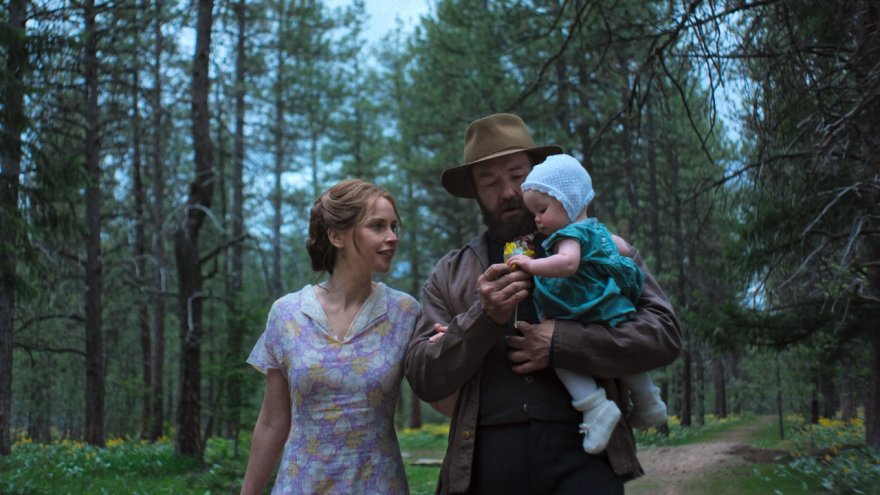DAN WEBSTER:
One of the enduring concepts taught in high-school history courses in the 1960s was that of Manifest Destiny. This refers, of course, to the then-widely accepted notion that it was inevitable—and right—for the country that began as 13 little colonies on the Atlantic Coast to sweep west until it claimed every bit of land right up to the edge of the Pacific Ocean—and maybe even beyond.
Opinions about this once-fervently held proclamation have evolved over the decades. One person’s sense of Manifest Destiny, after all, is someone else’s notion of unbridled imperialism. If nothing else, though, the many ways in which it has played out has been fodder for a number of great American films.
Calling Clint Bentley’s film Train Dreams great may be a bit of a stretch. “Greatish” might be a better description. Either way, the adaptation that Bentley and co-screenwriter Greg Kweder have made of Denis Johnson’s novella of the same name is a powerful study both of the effects that development has had on America and how, over the course of his life, the attendant changes—and the power of nature—mark the fate of one man.
That character is Robert Grainier (played poignantly by Joel Edgerton), a man thrown into adulthood at a young age, unaware of his past and coupled with a haunting sense of disconnection, certainly personally and maybe—at least for a while—even geographically.
Grainier is a worker, a logger and a railroad laborer. And as the film’s narration tells us (delivered by the always reliable Will Patton), he is the everyman through whom Bentley conveys the changes that America underwent during the early 20th century. It is through Grainier that we witness both the heedless destruction of old-growth forests and the resultant laying of railroad track that both bring progress and stand as a symbol of a new and ever-evolving national sensibility.
What’s the heedless part? That there’s little thought that the forests themselves might be a limited resource. In fact, one of Grainier’s fellow loggers makes clear the generally held sentiment of that day: those trees, he blithely suggests, will go on forever.
Another attitude that Grainier witnesses is no less a part of the American story. While working on a stretch of railroad track, he watches helplessly as a group of men grab a Chinese worker and throw him off the bridge that they’ve been building. That he might have done more to stop the men from committing murder haunts Grainier for years to come.
Somber moments such as this contrast with Grainier’s marvel at the forested landscape of Northeast Washington, where the film was mainly shot. Bentley captures such settings in scene after scene during what filmmakers call the “golden hour,” namely the first hour after sunrise and the hour just before sunset, times that tend to produce a warm, camera-friendly natural light.
It is that use of light, along with Bentley’s patient style, that makes Train Dreams feel like a cinematic meditation—a blending that works well in how the film captures the way that nature itself ultimately heals Grainier’s disconnected sensibility.
Bentley benefits markedly from the lead performance by Edgerton, who has the ability to say so much while speaking so little. He’s joined by the likes of Felicity Jones who plays Grainier’s wife Gladys, by Kerry Condon who plays a forest service worker, and William H. Macy who plays the veteran logger Arn—all of whom have small but noteworthy roles.
It would be wrong to write about Train Dreams and not include a quote from the late, acclaimed writer Johnson’s novella, to wit: “Now he slept soundly through the nights, and often he dreamed of trains, and often of one particular train: He was on it; he could smell the coal smoke; a world went by. And then he was standing in that world as the sound of the train died away. A frail familiarity in these scenes hinted to him that they came from his childhood.”
Given the beauty of Johnson’s language, it seems almost destiny—maybe even a manifest one—that Bentley should be the one to interpret it through film.
For Spokane Public Radio, I’m Dan Webster.
——
Movies 101 host Dan Webster is the senior film critic for Spokane Public Radio and a blogger for spokesman.com.



